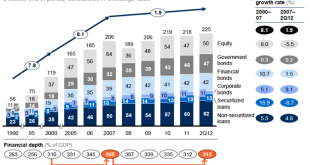By Simon Johnson, Ronald A. Kurtz Professor of Entrepreneurship, MIT Sloan School of Management The plan is based on sound economic and fiscal assumptions and allows for the implementation of policy initiatives without tax increases. This note provides my assessment of the financial viability of Stacey Abrams’ budget plan for the state of Georgia through fiscal 2028. This assessment was carried out at the request of the Stacey Abrams campaign for Georgia’s governor. Stacey...
Read More »Lars P. Syll — Why so-called deficits are economic necessities
Vintage Bill Vickrey quote.Lars P. Syll’s BlogWhy so-called deficits are economic necessitiesLars P. Syll | Professor, Malmo University
Read More »Matias Vernengo — Classical Political Economy and the Evolution of Central Banks
The paper analyzes briefly the changing ideas on the role of money and banks from William Petty to Thomas Tooke, including the works of Adam Smith, David Ricardo, and Karl Marx. It analyzes the role of ideas in shaping the evolution of central bank regulation. Particular importance is given to the Bank of England’s inconvertibility period, from 1797 to 1821, and the ensuing debate in shaping Robert Peel’s Bank Act of 1844, which is often seen as the birth of modern central banking. The...
Read More »Banks, Capital Markets, and Institutional Investors as Providers of Long-Term Finance
This is the second in a series of blog posts on financing infrastructure assets. From 1990 to 2012, the stock of global financial assets increased from $56 trillion to $225 trillion. In 2012, it included a $50 trillion stock market, $47 trillion public debt securities market, $42 trillion in financial institution bonds outstanding, $11 trillion in non-financial corporate bonds, and $62 trillion in non-securitized loans and $13 trillion in securitized loans outstanding (Figure 1). Figure...
Read More »Felipe Rezende — The Massive Need for Infrastructure in the Emerging and Developed World
This is the first in a series of blog posts on financing infrastructure assets. Multiplier EffectThe Massive Need for Infrastructure in the Emerging and Developed World Felipe Rezende | Director, Finance program and Associate Professor of Economics & Finance, Bard College and Levy Economics Institute
Read More »June Sekera — The absence of a theory of public economy in today’s economics
More than a century ago, the effective operation of the public economy was a significant, active concern of economists. With the insurgence of market-centrism and rational choice economics, however, government was devalued, its role circumscribed and seen from a perspective of “market failure.” As Backhouse (2005) has shown, the transformation in economic thinking in the latter half of the 20th century led to a “radical shift” in worldview regarding the role of the state. The very idea of a...
Read More » Heterodox
Heterodox

